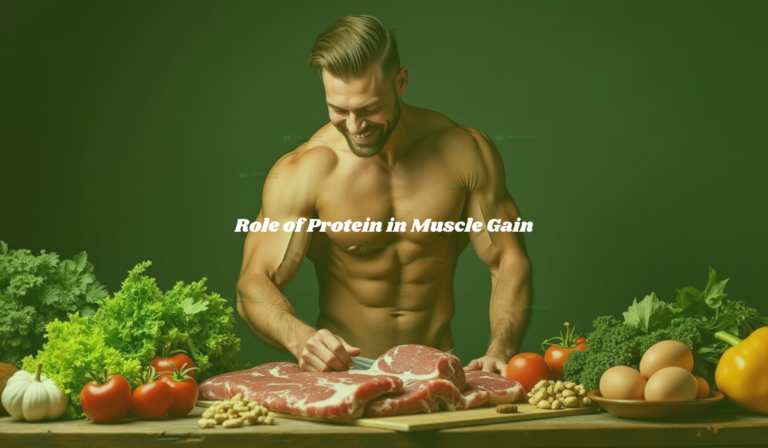Protein is one of the three macronutrients along with fats and carbohydrates. All these three are essential for your overall health and to achieve any health goal. Though the amount of all the three would differ for different health goals, you need to include these three in your diet. In this article, we will discuss the particular role of protein in muscle gain.

Protein is one of the most essential nutrients when it comes to muscle building. The first thing you need to know about is that protein is the building block of muscle tissues along with hair and skin; hence the importance of protein for muscle building increases double-fold.
Including protein in your diet for muscle building not only aids in muscle gain but also ensures an optimized performance and maintaining overall health.
The Role of Protein in Muscle Building

Why is protein so crucial in muscle building? You now know that protein is the building block of muscle tissues but why and how?
So, let’s start from the basics. Protein is made up of 20 amino acids out of which 9 are recognized as essential amino acids (EAAs) because there are the ones that you get from food as your body can’t produce them on its own.
Three of the essential amino acids, namely leucine, isoleucine and valine, also known as branch-chained amino acids play a major role in protein synthesis and prevent muscle breakdown.
The process of muscle building gives you effective results when muscle protein synthesis (MPS) exceeds the rate of muscle protein breakdown (MPB).
Here are ways in which protein helps in muscle growth:
Supports Muscle Protein Synthesis (MPS):
Protein helps in muscle protein synesthesia which is the process by which the body creates new muscle protein in order to repair the damaged muscles and build muscle tissues. After exercise your body is in a state of heightened protein synthesis. This state lasts for several hours and in this state you need fuel for your body which you will get by consuming protein. That is why adequate consumption of protein after workout is necessary for muscle recovery and growth.
Leucine is the protein that activates muscle protein synthesis.
Prevents Muscle Protein Breakdown (MPB)
Muscle protein synthesis not only supports muscle growth but also prevents muscle breakdown. Your body breaks down muscle tissue for energy in periods of intense training, fasting or caloric restriction. You need to consume enough protein to help your body protect against muscle breakdown. By consuming protein you provide an alternate energy source to your body which reduces muscle tissue for fuel.
Promotes recovery and reduces soreness:
Protein helps you on your recovery journey by reducing muscle soreness which is often referred to as delayed onset muscle soreness (DOMS). Protein is attributed to muscle gain because it helps in recovery of the tissues; that is why you need to ensure to take enough protein that can help to deliver the amino acids necessary for muscle recovery. You can then train your muscles more frequently and with great intensity.
Supports Strength Gains
Protein not only helps in recovery but also in gaining strength. Protein helps the muscle to grow stronger which is essential for both hypertrophy, which is increase in the size of muscles, and neural adaptations, which means better coordination and firing of motor units. Consuming adequate protein in your diet will help you to fuel your muscle growth which will eventually help to gain greater strength over time.
How Much Protein Do You Need for Muscle Gain?

The amount of protein that you need for muscle growth largely depends on your goal and your body needs. The other factors that influence your intake of protein include age, weight, gender, activity level and training intensity.
In this section here are some general guidelines on how much protein you should consume in order to build your muscles:
The general recommendation for protein intake is typically between 1.6 to 2.2 grams of protein per kilogram of your body weight.
If you are a beginner at building muscles, you should aim for the higher end of this range to ensure adequate protein for muscle repair and growth.
If you are an advanced athlete, you require more protein intake because you will be indulged in intense workout.
Protein Timing and Distribution
For muscle building protein intake’s timing and how you distribute its intake throughout the day matters a lot. You need to spread protein intake evenly across meals for more effective results. So rather than consuming protein in one or two meals, focus on eating protein throughout your day by including it in every meal and snack.
- Consume a small amount of protein pre-workout so it can help stimulate muscle protein synthesis during and after exercise.
- It is essential to consume protein within 30-60 minutes post-workout for muscle recovery and growth. This is the time when muscles are receptive to nutrients. This time period is also known as anabolic window where you need to consume the essential nutrients that can help in the recovery process.
- Before going to bed, consume a slow-digesting protein source to maintain a positive protein balance throughout the night, reducing muscle breakdown during sleep.
Types of Protein and Their Effects on Muscle Gain
There are multiple protein sources available which can be consumed to give your body an adequate amount of the nutrient to help in muscle growth. All proteins are created for different impacts on your body, so here is an outlook.
Complete proteins are those that contain all the nine essential amino acids which come from animal-based protein sources. Foods like eggs, meat, fish, poultry and dairy are complete proteins.
Incomplete proteins are the ones that lack one or more essential amino acids. These can be found in plant-based foods like grains, nuts, seeds and legumes. But when you combine different plant-based protein sources you will get all the essential amino acids required by your body. Some of the examples are combining rice and beans together to get the essential amino acids.
You can also get some of the protein sources from the market that are usually recommended to people when they are building muscle so they can get adequate amounts of protein for their body.
Whey protein:
Why protein, the most popular and recommended protein source during muscle building is derived from milk. It is one of the most effective proteins when it comes to muscle building. It is rich in essential amino acids, particularly leucine that initiated the process of protein synthesis. Whey protein has a quick absorption rate that is why it is consumed right after workout.
Whey protein has high bioavailability. It is rich in BCAAs and is a fast digesting source of protein which supports rapid muscle repair. People who are lactose intolerant or sensitive to dairy should avoid it because it may cause digestive discomfort.
Casein Protein:
Casein protein is also derived from milk but it is a slow-digesting protein which is ideal to consume before going to bed. This protein provides a steady release of amino acids into bloodstreams; that is why it is an ideal choice of protein sources for prolonged periods of fasting, especially overnight. Consuming it before going to sleep helps in preventing muscle breakdown and supporting muscle recovery during sleep.
Casein protein is consumed because of its many benefits including slow digestion, prevention of muscle breakdown and supporting muscle growth during sleep. On the other hand, it’s consumption can come with some of the cons like due to its slower absorption rate it is a less ideal choice of protein source to consume right after workout.
Egg Protein:
Eggs are considered complete protein because they have all the essential amino acids which is why people have the option of egg protein which is a high quality protein. The protein is derived from egg whites and is often suitable for people who are sensitive to dairy.
Consuming egg protein is preferred because it is a high-quality protein source which is low in fat and is easy to digest. Though not as fast-acting as whey, it is an effective protein source for muscle growth.
Plant-Based Proteins:
Plant-based protein sources such as soy protein, pea protein and rice protein are some of the popular choices for people who do not wish to add animal-based protein sources in their diet. Vegetarians and vegans who do not consume animal protein could always have multiple options when it comes to protein sources to build muscles. Plant-based protein is suitable for vegans and vegetarians. It is often hypoallergenic and lower in fat.
You have to take care when choosing plant-based protein because some plant proteins are incomplete or less effective in stimulating muscle protein synthesis. So choose the combinations that can help in protein synthesis and could aid in muscle gain simultaneously.
Common Myths About Protein and Muscle Gain

Some common revolve around protein and muscle gain. Let us go through those myths and understand the truth behind those misconceptions:
Myth 1: More Protein Equals More Muscle
Protein is an essential nutrient that will help in muscle growth journey. It aids in muscle building and in recovery but that does not mean that the more protein you consume the more muscle you will gain. You consume protein during the muscle building process because it is the building block of muscle tissues that helps in the tissue regeneration.
Myth 2: You Can’t Build Muscle on a Plant-Based Diet
Though incomplete, plant-based protein can still aid in muscle building. For muscle building you need to consume all the nine essential amino acids which one gets only from their diets. Animal-protein is considered a complete protein because it contains all the nine essential amino acids but that doesn’t mean you can’t build muscle on a plant-based diet. All you need to focus is on combining your protein sources so you can get complete amino acids for your body.
Myth 3: Protein Supplements Are Necessary for Muscle Gain
Protein supplements are a way to ensure your body’s protein needs but not a necessity for muscle gain. You can build muscle even without supplements by consuming a balanced meal that contains all the macro and micro nutrients. Add protein-rich whole foods like meat, fish, eggs, dairy, legumes and nuts in your diet for effective results.
Frequently Asked Questions
Which protein is good for muscle gain?
Ans. Include both animal-based and plant-based protein sources of whole foods in your diet to build muscles. Foods like fish, poultry, eggs, dairy, legumes, nuts, tofu, tempeh are some of the protein sources that are effective for muscle gain. Apart from that you can take supplement protein sources like whey protein, casein, egg protein, soy protein etc. Out of these whey protein is the most efficient protein source that is consumed right after your workout.
Can I gain muscle without protein?
Ans. Protein is crucial for muscle growth as it is the building block of muscle tissues so you need to consume protein sources in your diet. But protein alone won’t make a difference unless you consume a balanced diet with macro and micro nutrients in it. All the nutrients are essential if not for muscle growth but for overall health.




